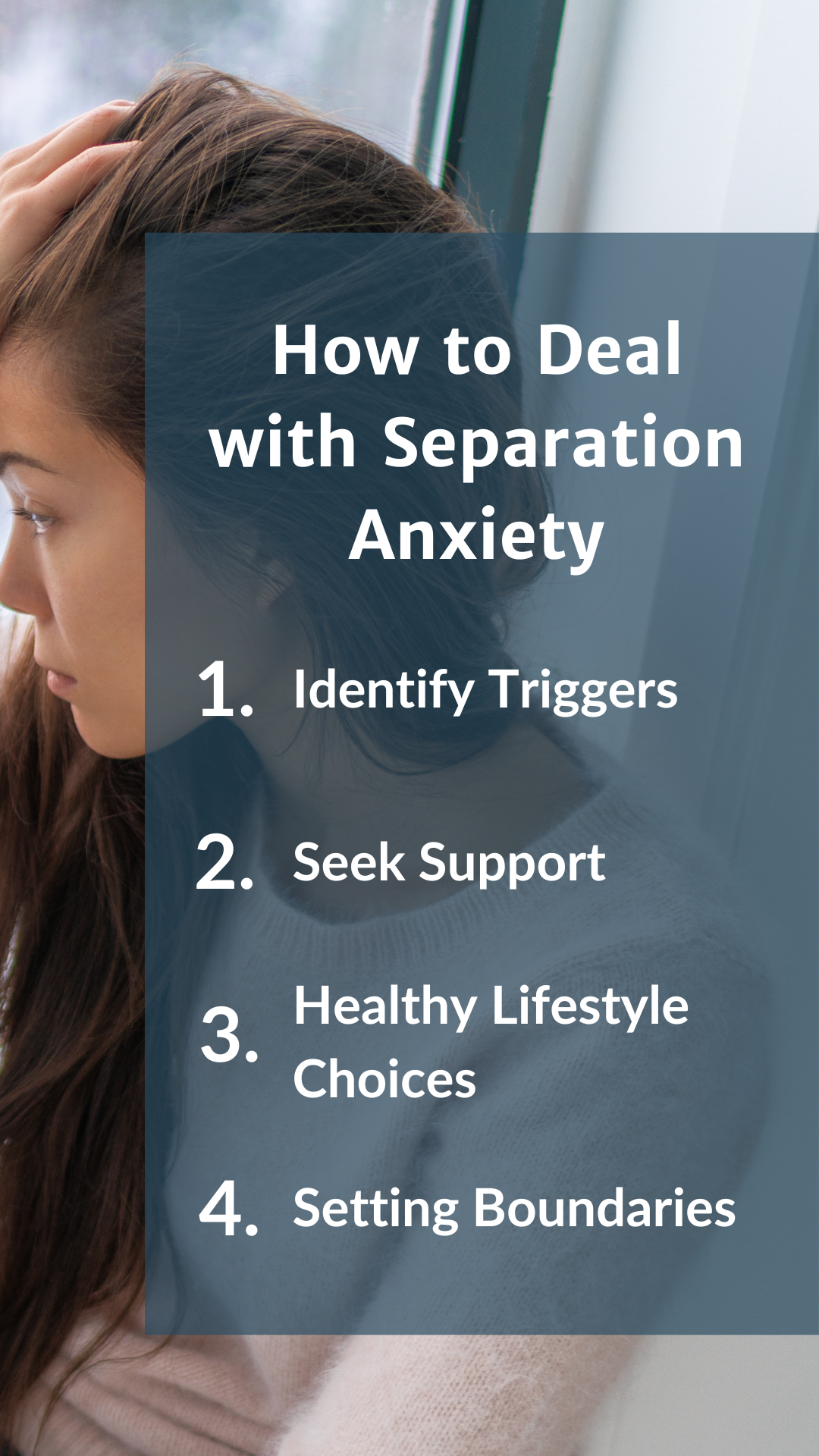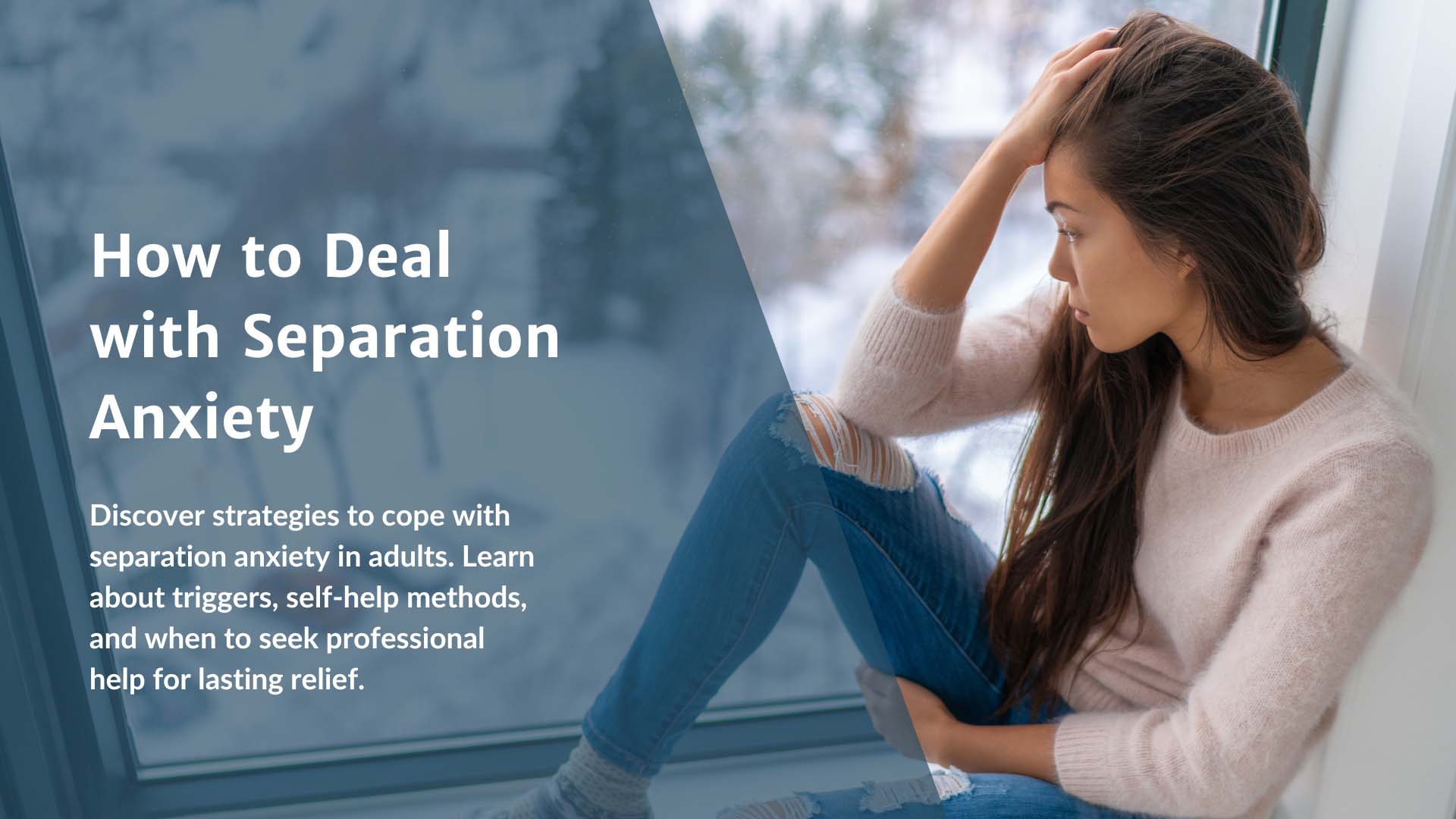Separation anxiety isn’t just a challenge for children or pets; it’s a reality many adults grapple with, too, especially in the context of personal relationships. This feeling, often characterized by a deep sense of unease or distress when away from loved ones or familiar environments, can be perplexing and disruptive. Today, we’ll explore strategies for coping with separation anxiety in adulthood, understand what triggers it, and recognize when it might be time to seek professional help. So, if you’re looking to know how to deal with separation anxiety in adults, keep reading.
Recognizing Separation Anxiety in Adults
Separation anxiety in adults, while less discussed, can be just as debilitating as it is in children. It’s not just about an irrational fear of being apart from loved ones; it can take various subtle and overt forms that impact daily life. Some examples include:
- Disproportionate Jealousy: One key indicator is excessive jealousy in relationships, often rooted in a deep fear of being abandoned. This is not your run-of-the-mill jealousy; it’s usually accompanied by overwhelming anxious thoughts and a persistent dread of solitude.
- Controlling Parental Behavior: In some adults, separation anxiety manifests as a need to overly control their children’s lives, a phenomenon sometimes called ‘reverse-separation anxiety.’ This controlling behavior stems from a fear of eventual separation from their children.
- Clinging to Unhealthy Relationships: Adults with separation anxiety might find themselves unable to leave even toxic relationships, driven by an intense fear of being alone. This can apply to romantic partnerships, friendships, and even familial ties.
- Dependence Beyond Norms: Some adults might exhibit a reluctance to achieve independence, often ‘mooching’ off their parents or over-relying on friends for support. This can be a sign of underlying separation anxiety, with the individual fearing the consequences of being on their own.
How to Deal With Separation Anxiety
Dealing with separation anxiety as an adult can be a challenging journey, but it’s one that can lead to personal growth and improved relationships. Here are some practical strategies to help you navigate through these anxious feelings:
- Self-Reflection and Acknowledgment: Begin by acknowledging your feelings of anxiety. Understanding and accepting that you are experiencing separation anxiety is a crucial first step toward addressing it.
- Identify Triggers: Take note of specific situations or thoughts that exacerbate your anxiety. Recognizing these triggers can help you prepare and develop coping mechanisms for when they occur.
- Seek Support: Don’t hesitate to connect with loved ones, friends, or join a support circle. Sharing your emotions often brings solace and a comforting sense of being heard and understood.
- Professional Guidance: Consider seeking help from a therapist or counselor who specializes in anxiety disorders. They can provide valuable tools and strategies tailored to your individual needs.
- Gradual Exposure: Slowly and steadily expose yourself to situations that trigger your anxiety but in a controlled manner. This can help desensitize you to such triggers over time.
- Mindfulness and Relaxation Techniques: Incorporate mindfulness practices, deep breathing exercises, or meditation into your daily routine. These can help manage anxiety symptoms and bring a sense of calm.
- Healthy Lifestyle Choices: Maintain a healthy lifestyle through regular exercise, a balanced diet, and adequate sleep. Physical well-being significantly impacts mental health.
- Setting Boundaries: Learn to set healthy boundaries in all of your relationships. It’s essential to have a sense of self that is independent of your relationships.
Remember, coping with separation anxiety is a process, and it’s okay to take it one step at a time. The key is to be patient with yourself and recognize each small victory along the way.
Recognizing the Need for Professional Help with Separation Anxiety
Understanding when to seek professional help for separation anxiety is crucial in taking a proactive step toward better mental health. Here are some key indicators that it might be time to consult a professional:
- Persistent and Intense Anxiety: If your anxiety is consistently high and doesn’t seem to diminish over time, it could be a sign that professional intervention is needed.
- Interference with Daily Life: When anxiety starts to significantly interfere with your work, relationships, or daily activities, it’s important to consider seeking help.
- Physical Symptoms: Persistent anxiety can manifest physically, causing symptoms like insomnia, digestive issues, or chronic fatigue. If you’re experiencing these, it could be a sign to get professional help.
- Avoidance Behavior: If you find yourself increasingly avoiding situations, people, or activities due to anxiety, it might be time to speak with a professional.
- Strained Relationships: If your anxiety is causing noticeable strain in your relationships or leading to conflict, professional guidance can help you navigate these challenges.
- Previous Self-Help Efforts Haven’t Worked: If you’ve tried self-help strategies or informal support but haven’t seen improvement, a professional can offer more specialized assistance.
- Feelings of Helplessness or Hopelessness: If you feel overwhelmed by your anxiety to the point of helplessness or hopelessness, it’s a strong indicator that professional help could be beneficial.
Remember, seeking professional help is not a sign of weakness but an indicator of inner strength. It’s a proactive step towards understanding and managing your anxiety more effectively. A mental health professional can provide tailored strategies and support to help you navigate through separation anxiety and improve your overall well-being.
The Power of Conversation: How Talking Helps
Engaging in conversation, whether with a trusted family member or a therapist, can be a powerful tool in managing separation anxiety. Here’s how the simple act of talking can make a significant difference:
- Validation and Understanding: Sharing your feelings with someone who listens attentively can validate your emotions and experiences. This understanding often brings a sense of relief and reduces the sense of isolation that often accompanies anxiety.
- Perspective and Insight: Conversations can provide fresh perspectives. A family member may share personal experiences or insights that resonate with you, while a therapist can offer professional guidance to help you understand your emotions and behaviors.
- Emotional Release: Talking allows you to express and release pent-up emotions. It’s a healthy way to vent frustrations, fears, and anxieties, which can reduce the intensity of these feelings.
- Problem-Solving: Through dialogue, you can collaboratively identify problems and work towards solutions. A therapist, in particular, can help you develop coping strategies and techniques to manage anxiety.
- Building Support Networks: Regular conversations build stronger emotional connections, creating a support network that you can rely on during challenging times.
- Reducing Stigma: Discussing mental health openly can help break down stigma, making it easier to seek help and encouraging others to do the same.
- Encouragement and Hope: Positive and supportive conversations can instill a sense of hope and encouragement, motivating you to take steps toward managing your anxiety.
- Learning Self-Expression: Talking helps you articulate your thoughts and feelings, improving your ability to communicate effectively, which is a vital skill in all relationships.
- Cognitive Processing: Discussing your experiences and feelings can help you process them cognitively, leading to better understanding and coping.
Remember, the power of conversation should not be underestimated. Whether it’s with a family member, friend, or therapist, talking about your experiences can be a transformative step toward managing separation anxiety and improving your overall well-being.
Finding Support with Mente
The key takeaway here is that you’re not alone in your struggle with separation anxiety. Here at Mente, we understand the challenges you face and are here to support you every step of the way. Don’t hesitate to reach out and embrace the caring, guiding hand we offer. Together, we’ll navigate this journey, moving towards a place of peace and empowerment. So, don’t suffer in silence any longer; call us today, and let’s get started!
Frequently Asked Questions: How to Deal with Separation Anxiety
How to deal with separation anxiety in adults
How to deal with separation anxiety in relationships
How to deal with separation anxiety in babies
What triggers separation anxiety?
Separation anxiety is triggered by changes or disruptions in familiar routines, environment, or significant relationships. In babies and young children, it's a developmental phase. In adults, it can be triggered by life changes, loss, or traumatic events. Fear of abandonment, insecurity, or past experiences can intensify separation anxiety in both children and adults. Understanding these triggers is crucial for effective coping.

